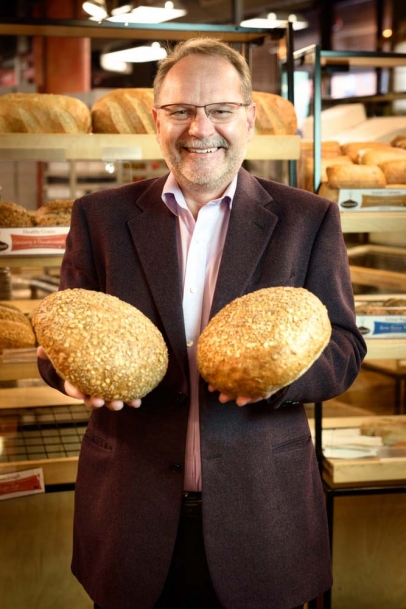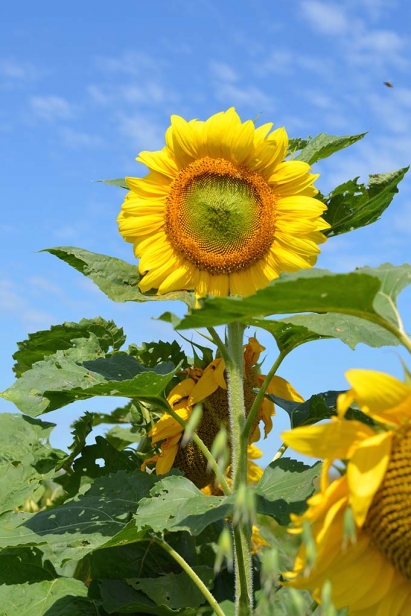For the Love of Bread and Earth
For Gottfried Boehringer, a loaf of bread is not only the staff of life but, when well made, a measure of a life well lived.
“For more than a century, my family has made bread only the best way we know how,” said the president of Stonemill Bakehouse, an Ontario-based producer of European-style breads. “We’re tenacious about this — never taking short cuts, never seeking the easy way.”
For Boehringer, one of the company’s best breads is the Prince Edward County Rye Bread, sold only at Sobey’s as one of that company’s Artisan brand offerings.
“In developing the recipe for this bread, I was inspired by a childhood memory that has always deeply marked me,” Boehringer recalls. “It all happened back in Germany, in a little village my family visited where the women would make a wonderful dough and bake it in the communal ovens.”
Each woman would make her own dough in the early morning, beginning with a sourdough starter. The dough would mature over eight or 10 hours. And in late afternoon, the women would shape the dough into loaves and make their way down to the ovens.
“The baking was all part of a rich moment of community life,” Boehringer says. “The women would sit around telling stories while their children played around them. That wonderful odor of baking bread would fill the air — and I remember a sense of life unfolding the way it should.”
The taste of the bread was superlative, he recalls — “a very hardy German rye, with a rich flavour and a wonderful earthy mouth feel.”
The rye in the bread comes from Prince Edward County, which is on a headland on Lake Ontario near Belleville. That’s where the Stonemill Bakehouse has purchased a small farm on which Boehringer plans to grow an increasing part of the grains that go into the company’s many lines of bread. Like the bread itself, this will take the company back to long-term European practice, with small farms producing grain that is processed locally for use by local bakers.
This return to historic ways pleases Boehringer — but his real motivation is concern for the environment. Every company must find ways of reducing its environmental footprint. For a baking company, that means that shipping grain and flour from long distances should be cut to a minimum to reduce the release of greenhouse gases.
Most of the flour his company uses has been sourced from grain from the prairies or even other countries.
“It can be quite silly,” Boehringer says. “A few years ago, I was considering ordering sunflower seeds from China — and yet, when I was driving around Prince Edward County, I saw sunflowers growing in field after field. I thought, ‘Why can’t we have the local infrastructure so that sunflower seeds and rye and wheat, grown in Ontario, could be used by our own bakers?’”
If growing grain locally for local processing was the ideal solution, then Boehringer would lead the way.
Five years ago, he purchased a small farm of 100 acres near Waupoos, in Prince Edward County. Stonemill Farm, as it’s now called, each year since then has grown more and more rye and spelt.
The first test crop of rye, a small one, was actually grown on Cherryvale Organic Farms, who found that rye could flourish on the soil of Prince Edward County.
In 2011, Boehringer seeded rye on the fields of Stonemill Farms and contracted with several local farmers to grow additional rye on their fields. In 2012, 60 tonnes was harvested, a number that will top out at 200 tonnes this year.
Though the rye production is gratifying, the Stonemill Bakehouse has even greater need for wheat. Next year, Boehringer will engage an agronomist to identify which wheat varieties grow best in eastern Ontario. By 2018, he hopes to have 2,000 acres in the ground, mostly contracted with other farmers.
He has found a southern Ontario mill that processes the grain he and his fellow farmers will be producing.
The aim, ultimately, is to get other bakers into the action. “We want to have an open system so that our peers can step in and do the same thing,” Boehringer says. “But the logistics are complicated and we’re still figuring things out ourselves. When we have a finished system, our model may attract other bakers.”
Boehringer is dead serious about the need to take care of the environment. In 2007, he commissioned an environmental study that showed how the company could reduce its energy consumption.
Currently, the company uses emissions-free power from wind and hydro generators, has retrofitted its entire bakery to use energyefficient lights and appliances, and has reduced water consumption by 25 per cent.
“We have to do these things for the generations to come,” he says. “I want my daughters to receive a world that’s a little better than the one we received—and I want to give them an example of how to live responsibly.”
If in the process he can give everyone some superlative bread, that’s a bonus.





